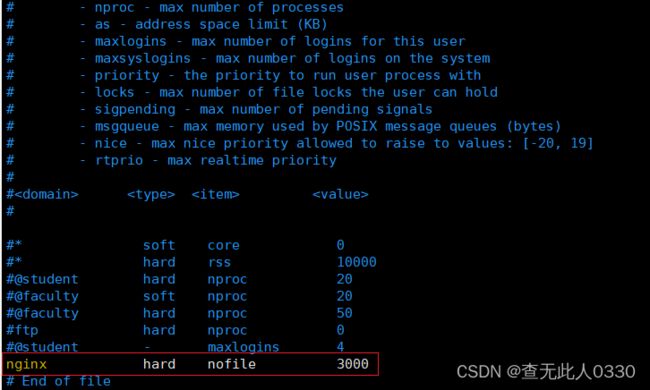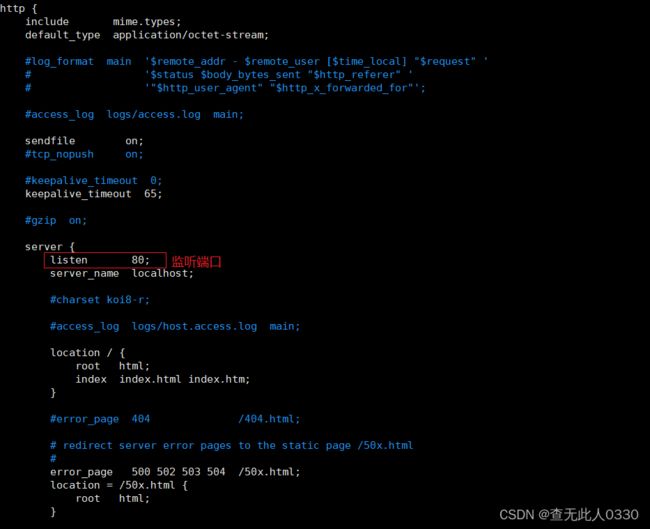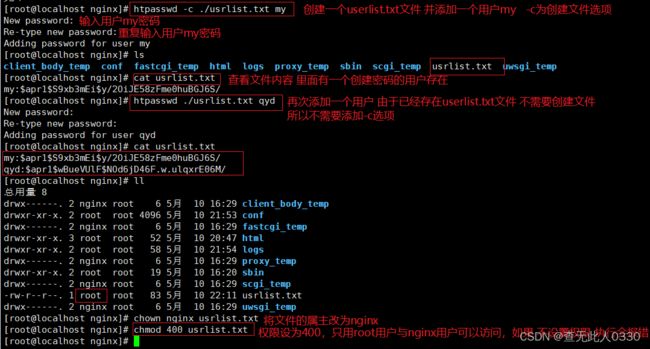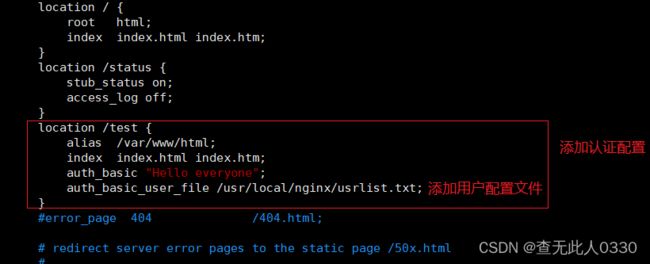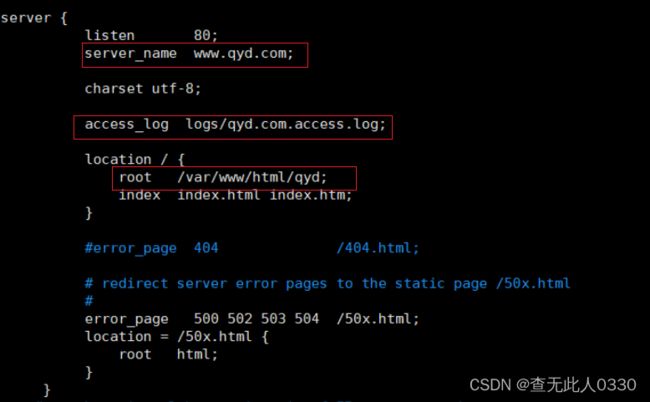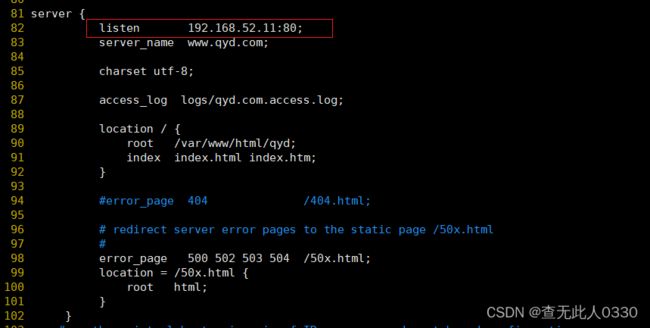Nginx网络服务
目录
1、Nginx基础
1.1Nginx和Apache的差异
1.2Nginx和Apache的优缺点比较
1.3编译安装Nginx服务
2、认识Nginx服务的主配置文件 nginx.conf
1、全局配置
2、I/O事件配置
3、HTTP设置
4、访问状态统计配置
5、基于授权的访问控制
6、基于客户端的访问控制
7、基于域名的Nginx虚拟主机
8、基于IP的Nginx虚拟主机
9、基于端口的Nginx虚拟主机
1、Nginx基础
- 一款高新能、轻量级Web服务软件
- 稳定性高
- 系统资源消耗低
- 对HTTP并发连接的处理能力高
- 单台物理服务器可支持30 000~50 000个并发请求。
1.1Nginx和Apache的差异
- 轻量级,Nginxt比Apache占用更少的内存及资源:
- 静态处理,Nginx静态处理性能比Apache高;
- Nginx可以实现无缓存的反向代理加速,提高网站运行速度;
- Nginx支持热部署,启动速度迅速,可以在不间断服务的情况下,对软件版本或者配置进行升级;
- Nginx高度模块化,编写模块相对简单,且组件比Apache少;
- 高并发下Nginx能保持低资源低消耗高性能;
- Nginx是异步进程,多个连接可以对应一个进程;Apache是同步多进程,一个连接对应一个进程;
- Nginx的性能和可伸缩性不依赖于硬件,Apache依赖于硬件;
- Nginx配置简洁,Apache配置复杂。
1.2Nginx和Apache的优缺点比较
nginx相对于apache的优点∶
- 轻量级,同样起web服务,比Apache占用更少的内存及资源。
- 高并发,Nginx处理请求是异步非阻塞的,而Apache是阻塞型的在高并发下,Nginx能保持低资源低消耗高性能。
- 高度模块化的设计。
- 编写模块相对简。
- 社区活跃,各种高性能模块出品速度
apache相对于nginx的优点∶
- rewrite比nginx的rewrite强大
- 模块多,基本想到的都可以找到
- 少bug, Nginx的bug相对较超稳定
存在就是理由,一般来说,需要性能的web服务,用Nginx。如果不需要性能只求稳定,那就Apache。Nginx处理动态请求是弱项,一般动态请求要Apache去做,Nginx只适处理静态网页或反向代理。
1.3编译安装Nginx服务
1、关闭防火墙
[root@localhost ~]# systemctl stop firewalld
[root@localhost ~]# systemctl disable firewalld
Removed symlink /etc/systemd/system/multi-user.target.wants/firewalld.service.
Removed symlink /etc/systemd/system/dbus-org.fedoraproject.FirewallD1.service.
[root@localhost ~]# setenforce 0nginx的配置及运行需要pcre、zlib等软件包的支持,因此需要安装这些软件的开发包,以便提供相应的库和头文件。
[root@localhost ~]# yum -y install pcre-devel zlib-devel gcc gcc-c++ make
3、创建运行用户、组
Nginx 服务程序默认以 nobody 身份运行,建议为其创建专门的用户账号,以便更准确地控制其访问权限
[root@localhost ~]# useradd -M -s /sbin/nologin/ nginx4、将安装nginx所需的软件包传到/opt目录下并解压
[root@localhost ~]# cd /opt
[root@localhost opt]# ls
rh
[root@localhost opt]# rz -E
rz waiting to receive.
[root@localhost opt]# ls
nginx-1.12.0.tar.gz rh
[root@localhost opt]# tar zxvf nginx-1.12.0.tar.gz -C /opt/
nginx-1.12.0/
5、编译安装Nginx
配置
[root@localhost opt]# ls
nginx-1.12.0 nginx-1.12.0.tar.gz rh
[root@localhost opt]# cd nginx-1.12.0/
[root@localhost nginx-1.12.0]# ls
auto CHANGES CHANGES.ru conf configure contrib html LICENSE man README src
[root@localhost nginx-1.12.0]# ./configure \
> --prefix=/usr/local/nginx \
> --user=nginx \
> --group=nginx \
> --with-http_stub_status_module
编译安装
[root@localhost nginx-1.12.0]# make && make install ![]()
6、优化路径
[root@localhost local]# ln -s /usr/local/nginx/sbin/nginx /usr/local/sbin/
创建软连接 方便系统识别![]()
7、 检查、启动、重启、停止Nginx服务
nginx -t #检查配置文件是否配置正确
nginx #启动
#停止
cat /usr/local/nginx/logs/nginx.pid #先查看nginx的PID号
kill -3
或者
killall -3 nginx
killall -s QUIT nginx
------------------------------------------------
#重载
kill -1
kill -s HUP
killall -1 nginx
killall -s HUP nginx
-----------------------------------------------
#日志分隔,重新打开日志文件
kill -USR1
-----------------------------------------------
#平滑升级
kill -USR2
------------------------------------------------
新版本升级
tar -zxvf nginx-1.xx.xx.tar.gz
cd nginx-1.xx.xx
./configure \
-prefix=/usr/local/ngink \
-user=nginx\
-group=nginx \
-with-http stub_status _module\
-with-http_ssl_module
make
mv /usr/local/nginx/sbin/nginx /usr/local/nginx/sbin/nginx_old
cp objs/nginx /usr/local/nginx/sbin/nginx
make upgrade
#或者先killall nginx,再/usr/local/nginx/sbin/nginx
开启
关闭
法一
[root@localhost sbin]# nginx
[root@localhost sbin]# netstat -natp | grep nginx
tcp 0 0 0.0.0.0:80 0.0.0.0:* LISTEN 6783/nginx: master
[root@localhost sbin]# cat /usr/local/nginx/logs/nginx.pid
6783
[root@localhost sbin]# kill -3 6783
[root@localhost sbin]# netstat -natp | grep nginx
法二
8、添加 Nginx 系统服务
法一
vim /etc/init.d/nginx
#!/bin/bash
#chkconfig: 35 99 20
#description:Nginx Service Control Script
COM="/usr/local/nginx/sbin/nginx"
PID="/usr/local/nginx/logs/nginx.pid"
case "$1" in
start)
$COM
;;
stop)
kill -s QUIT $(cat $PID)
;;
restart)
$0 stop
$0 start
;;
reload)
kill -s HUP $(cat $PID)
;;
*)
echo "Usage: $0 {start|stop|restart|reload}"
exit 1
esac
exit 0
chmod +x /etc/init.d/nginx
chkconfig --add nginx #添加为系统服务
systemctl stop nginx
systemctl start nginx
法二
vim /lib/systemd/system/nginx.service
[Unit]
Description=nginx
After=network.target
[Service]
Type=forking
PIDFile=/usr/local/nginx/logs/nginx.pid
ExecStart=/usr/local/nginx/sbin/nginx
ExecReload=/bin/kill -s HUP $MAINPID
ExecStop=/bin/kill -s QUIT $MAINPID
PrivateTmp=true
[Install]
WantedBy=multi-user.target
chmod 754 /lib/systemd/system/nginx.service
systemctl start nginx.service
systemctl enable nginx.service
-----------------------------------------------------
[Unit]:服务的说明
Description :描述服务
After:依赖,当依赖的服务启动之后再启动自定义的服务
[service]服务运行参数的i设置
Type=forking是后台运行的形式,使用此启动类型应同时指定
PIDFile=,以便systemd能够跟踪服务的主进程。Execstart为服务的具体运行命令
ExecReload为重启命令
Execstop为停止命令
PrivateTrmp=True丧示给服务分配独立.的临时空间
注意:启动、重启、停止命令全部要求使用绝对路径
[Insta11]服务安装的相关设置,可设置为多用户
2、认识Nginx服务的主配置文件 nginx.conf
配置文件包含的内容
- 全局块:全局配置,对全局生效;
- events块:配置影响Nginx服务器与用户的网络连接;
- http块:配置代理,缓存,日志定义等绝大多数功能和第三方模块的配置;
- server块:配置虚拟主机的相关参数,一个http块中可以有多个server块;
- location块:用于配置匹配的uri;
- upstream:配置后端服务器具体地址,负载均衡配置不可或缺的部分。
vim /usr/local/nginx/conf/nginx.conf 1、全局配置
#user nobody; #运行用户,若编译时未指定则默认为 nobody
worker_ processes 1; #工作运行数量,一般设置为和CPU核数一样
#error_log logs/error.log; #错误日志文件的位置
#pid logs/nginx.pid; #PID文件的位置
2、I/O事件配置
events {
use epoll; #使用 epoll 模型以提高性能,2.6 以上版本建议使用
worker_connections 1024; #每个进程处理1024个连接
}允许 Nginx 正常提供服务的连接数(并发量):工作进程数为 1,每个进程处理 1024 个连接,则为cpu核数*连接数(1*1024=1024)
- 如提高每个进程的连接数还需执行"ulimit -n 65535"命令临时修改本地每个进程可以同时打开的最大文件数。
- 在Linux平台.上,在进行高并发TCP连接处理时,最高的并发数量都要受到系统对用户单一进程同时可打开文件数量的限制(这是因为系统为每个TCP连接都要创建一个socket句柄,每个socket句柄同时也是一个文件句柄)。
- 可使用ulimit -a命令查看系统允许当前用户进程打开的文件数限制。
- epoll(socket描述符)是Linux内核为处理大批量文件描述符而作了改进的poll,是Linux下多路复用IO接口select/poll的增强版本,它能显著提高程序在大量并发连接中只有少量活跃的情况下的系统CPU利用率
内核优化:
vim /etc/security/limits.conf 3、HTTP设置
http {
##文件扩展名与文件类型映射表
include mime.types;
##默认文件类型
default_type application/octet-stream;
##日志格式设定
#log_format main '$remote_addr - $remote_user [$time_local] "$request" '
# '$status $body_bytes_sent "$http_referer" '
# '"$http_user_agent" "$http_x_forwarded_for"';
##访问日志位置
#access_log logs/access.log main;
##开启文件传输模式
sendfile on;
##减少网络报文段的数量
#tcp_nopush on;
##连接保持超时时间,单位是秒
#keepalive_timeout 0; #不开启长连接
keepalive_timeout 65;
##gzip模块设置,设置是否开启gzip压缩输出
#gzip on;
##Web 服务的监听配置
server {
##监听地址及端口
listen 80;
##站点域名,可以有多个,用空格隔开
server_name localhost;
##网页的默认字符集
charset utf-8;
##根目录配置
location / {
##网站根目录的位置/usr/local/nginx/html
root html;
##默认首页文件名
index index.html index.htm;
}
##内部错误的反馈页面
error_page 500 502 503 504 /50x.html;
##错误页面配置
location = /50x.html {
root html;
}
}
}
日志格式设定:
$remote_addr与$http_x_forwarded_for用以记录客户端的ip地址;
$remote_user:用来记录客户端用户名称;
$time_local: 用来记录访问时间与时区;
$request: 用来记录请求的url与http协议;
$status: 用来记录请求状态;成功是200,
$body_bytes_sent :记录发送给客户端文件主体内容大小;
$http_referer:用来记录从那个页面链接访问过来的;
$http_user_agent:记录客户浏览器的相关信息;
通常web服务器放在反向代理的后面,这样就不能获取到客户的IP地址了,
通过$remote_add拿到的IP地址是反向代理服务器的iP地址。
反向代理服务器在转发请求的http头信息中,
可以增加x_forwarded_for信息,用以记录原有客户端的IP地址和原来客户端的请求的服务器地址。
location常见配置指令, root(根路径配置)、alias(别名配置)、proxy_ pass (反向代理配置)
root(根路径配置)∶ 请求root /var/www/html
请求www.kgc.com/test/1.html,会返回文件/var/www/html/test/1.html
alias(别名配置):alias /var/www/html
请求www.kgc.com/test/1.html,会返回文件/var/www/html/1.htmlroot (根)
第一种情况
如果访问http://192.168.52.110/my/test/test.html 访问的路径为:/usr/local/nginx/html/my/test/test.html
第二种情况
如果访问http://192.168.52.110/my/test/test.html 访问的路径为:/usr/local/nginx/html/my/test/test.html
alias(别名)
[root@localhost ~]# mkdir -p /var/www/html
[root@localhost ~]# cd /var/www/html
[root@localhost html]# ls
[root@localhost html]# echo "this is var" > test.html
[root@localhost html]# ls
test.html
[root@localhost html]# cat test.html
this is var
[root@localhost html]# vim /usr/local/nginx/conf/nginx.conf
------------------------------------------------------------------
location /test {
alias /var/www/html;
index index.html index.htm;
}
[root@localhost html]# nginx -t #检查语法
nginx: the configuration file /usr/local/nginx/conf/nginx.conf syntax is ok
nginx: configuration file /usr/local/nginx/conf/nginx.conf test is successful
[root@localhost html]# systemctl restart nginx #重启服务
4、访问状态统计配置
1、查看安装模块
- 查看当前nginx版本号 nginx -v
- 当前nginx版本号还能够看到安装时配置的参数 nginx -V
- 先使用命令/usr/local/nginx/sbin/nginx -V 查看已安装的 Nginx 是否包HTTP_STUB_STATUS 模块,cat /opt/nginx-1.12.0/auto/options | grep YES #查看nginx已安装的所有模块
/usr/local/sbin/nginx -V #查看已安装Nginx是否包含HTTP_STUB_STATUS模块
cat /opt/nginx-1.12.0/auto/options | grep YES #查看nginx已安装的所有模块2、修改 nginx.conf 配置文件,指定访问位置并添加 stub_status 配置
[root@localhost ~]#cd /usr/local/nginx/conf
[root@localhost conf]# ls
fastcgi.conf fastcgi_params.default mime.types nginx.conf.default uwsgi_params
fastcgi.conf.default koi-utf mime.types.default scgi_params uwsgi_params.default
fastcgi_params koi-win nginx.conf scgi_params.default win-utf
[root@localhost conf]# cp nginx.conf nginx.conf.bak #备份配置文件 以防配置出错
vim /usr/local/nginx/conf/nginx.conf
......
http {
......
server {
listen 80;
server_name localhost;
charset utf-8;
location / {
root html;
index index.html index.htm;
}
-----------------------------------------------------------
##添加 stub_status 配置##
location /status { #访问位置为/status
stub_status on; #打开状态统计功能
access_log off; #关闭此位置的日志记录
}
}
}
[root@localhost conf]# nginx -t
nginx: the configuration file /usr/local/nginx/conf/nginx.conf syntax is ok
nginx: configuration file /usr/local/nginx/conf/nginx.conf test is successful
[root@localhost conf]# systemctl restart nginx
3、重启服务,访问测试
浏览器访问 http://192.168.52.110/status
Active connections :表示当前的活动连接数;
server accepts handled requests :表示已经处理的连接信息,三个数字依次表示已处理的连接数、成功的TCP握手次数、 已处理的请求数。 可以curl -Ls http://192.168.52.110/status结合awk来写shell脚本,如果链接数过高报警
可以curl -Ls http://192.168.52.110/status结合awk来写shell脚本,如果链接数过高报警
vim 1.sh
-------------------------------------------------------
#!/bin/bash
con=`curl -Ls http://192.168.239.10/status | awk 'NR==1{print $3}'`
if [ $con -gt 20000 ]
then
echo "当前并发数量为 $con ,超过预警值"
fi5、基于授权的访问控制
1、生成用户密码认证文件
[root@localhost nginx]# pwd
/usr/local/nginx
[root@localhost nginx]# yum install httpd-tools -y
[root@localhost nginx]# htpasswd -c ./usrlist.txt my
New password:
Re-type new password:
Adding password for user my
[root@localhost nginx]# ls
client_body_temp conf fastcgi_temp html logs proxy_temp sbin scgi_temp usrlist.txt uwsgi_temp
[root@localhost nginx]# cat usrlist.txt
my:$apr1$S9xb3mEi$y/2OiJE58zFme0huBGJ6S/
[root@localhost nginx]# htpasswd ./usrlist.txt qyd
New password:
Re-type new password:
Adding password for user qyd
[root@localhost nginx]# cat usrlist.txt
my:$apr1$S9xb3mEi$y/2OiJE58zFme0huBGJ6S/
qyd:$apr1$wBueVUlF$NOd6jD46F.w.ulqxrE06M/
[root@localhost nginx]# ll
总用量 8
drwx------. 2 nginx root 6 5月 10 16:29 client_body_temp
drwxr-xr-x. 2 root root 4096 5月 10 21:53 conf
drwx------. 2 nginx root 6 5月 10 16:29 fastcgi_temp
drwxr-xr-x. 3 root root 52 5月 10 20:47 html
drwxr-xr-x. 2 root root 58 5月 10 21:54 logs
drwx------. 2 nginx root 6 5月 10 16:29 proxy_temp
drwxr-xr-x. 2 root root 19 5月 10 16:20 sbin
drwx------. 2 nginx root 6 5月 10 16:29 scgi_temp
-rw-r--r--. 1 root root 83 5月 10 22:11 usrlist.txt
drwx------. 2 nginx root 6 5月 10 16:29 uwsgi_temp
[root@localhost nginx]# chown nginx usrlist.txt
[root@localhost nginx]# chmod 400 usrlist.txt
[root@localhost nginx]# ll
总用量 8
drwx------. 2 nginx root 6 5月 10 16:29 client_body_temp
drwxr-xr-x. 2 root root 4096 5月 10 21:53 conf
drwx------. 2 nginx root 6 5月 10 16:29 fastcgi_temp
drwxr-xr-x. 3 root root 52 5月 10 20:47 html
drwxr-xr-x. 2 root root 58 5月 10 21:54 logs
drwx------. 2 nginx root 6 5月 10 16:29 proxy_temp
drwxr-xr-x. 2 root root 19 5月 10 16:20 sbin
drwx------. 2 nginx root 6 5月 10 16:29 scgi_temp
-r--------. 1 nginx root 83 5月 10 22:11 usrlist.txt
drwx------. 2 nginx root 6 5月 10 16:29 uwsgi_temp
2、修改主配置文件相对应目录,添加认证配置项
[root@localhost nginx]# vim /usr/local/nginx/conf/nginx.conf
-------------------------------------------------------------------
location /test {
alias /var/www/html;
index index.html index.htm;
auth_basic "Hello everyone";
auth_basic_user_file /usr/local/nginx/usrlist.txt;
}
3、重启服务,访问测试
[root@localhost nginx]# nginx -t #检查语法
nginx: the configuration file /usr/local/nginx/conf/nginx.conf syntax is ok
nginx: configuration file /usr/local/nginx/conf/nginx.conf test is successful
[root@localhost nginx]# systemctl restart nginx #重启服务
输入网址http://192.168.52.110/test/test.html
6、基于客户端的访问控制
Nginx 基于客户端的访问控制规则如下:
- deny IP/IP 段:拒绝某个IP或I 段的客户端访问。
- allow IP/IP 段:允许某个IP或IP段的客户端访问。
- 规则从上往下执行,如匹配则停止,不再往下匹配。
[root@localhost ~]# vim /usr/local/nginx/conf/nginx.conf
---------------------------------------------------
location /test {
alias /var/www/html;
index index.html index.htm;
auth_basic "Hello everyone";
auth_basic_user_file /usr/local/nginx/usrlist.txt;
deny 192.168.52.110;
}
重启服务 ,访问测试
[root@localhost ~]# systemctl restart nginx
7、基于域名的Nginx虚拟主机
虚拟主机有三种:基于域名、基于IP、基于端口
1、为虚拟主机提供域名解析
[root@localhost ~]# vim /etc/hosts
----------------------------------------------------------------------------------
127.0.0.1 localhost localhost.localdomain localhost4 localhost4.localdomain4
::1 localhost localhost.localdomain localhost6 localhost6.localdomain6
192.168.52.110 www.my.com www.qyd.com
2、为虚拟主机准备网页文档
[root@localhost conf]# cd /var/www/html/
[root@localhost html]# ls
test.html
[root@localhost html]# mkdir my qyd
[root@localhost html]# ls
my qyd test.html
[root@localhost html]# echo "this is my test web" > my/index.html
[root@localhost html]# echo "this is qyd test web" > qyd/index.html
3、修改Nginx配置文件
[root@localhost ~]# cd /usr/local/nginx/conf/
[root@localhost conf]# ls
fastcgi.conf fastcgi_params.default mime.types nginx.conf.bak scgi_params.default win-utf
fastcgi.conf.default koi-utf mime.types.default nginx.conf.default uwsgi_params
fastcgi_params koi-win nginx.conf scgi_params uwsgi_params.default
[root@localhost conf]# cp nginx.conf.default nginx.conf #还原默认的配置文件
cp:是否覆盖"nginx.conf"? y
----------------------------------------------------------------
server {
listen 80;
server_name www.my.com;
charset utf-8;
access_log logs/my.com.access.log;
location / {
root /var/www/html/my;
index index.html index.htm;
}
#error_page 404 /404.html;
# redirect server error pages to the static page /50x.html
#
error_page 500 502 503 504 /50x.html;
location = /50x.html {
root html;
}
server {
listen 80;
server_name www.qyd.com;
charset utf-8;
access_log logs/qyd.com.access.log;
location / {
root /var/www/html/qyd;
index index.html index.htm;
}
#error_page 404 /404.html;
# redirect server error pages to the static page /50x.html
#
error_page 500 502 503 504 /50x.html;
location = /50x.html {
root html;
}
}
重启服务 ,输入域名进行测试
[root@localhost conf]# nginx -t
nginx: the configuration file /usr/local/nginx/conf/nginx.conf syntax is ok
nginx: configuration file /usr/local/nginx/conf/nginx.conf test is successful
[root@localhost conf]# systemctl restart nginx
8、基于IP的Nginx虚拟主机
1、设置虚拟IP
[root@localhost ~]# ifconfig ens33:0 192.168.52.11/24
[root@localhost ~]# ifconfig
ens33: flags=4163 mtu 1500
inet 192.168.52.110 netmask 255.255.255.0 broadcast 192.168.52.255
inet6 fe80::d6fa:c8c:b90d:12db prefixlen 64 scopeid 0x20
ether 00:0c:29:e6:f0:79 txqueuelen 1000 (Ethernet)
RX packets 85179 bytes 76908377 (73.3 MiB)
RX errors 0 dropped 0 overruns 0 frame 0
TX packets 38826 bytes 9886685 (9.4 MiB)
TX errors 0 dropped 0 overruns 0 carrier 0 collisions 0
ens33:0: flags=4163 mtu 1500
inet 192.168.52.11 netmask 255.255.255.0 broadcast 192.168.52.255
ether 00:0c:29:e6:f0:79 txqueuelen 1000 (Ethernet)
2、编辑配置文件
[root@localhost ~]# vim /usr/local/nginx/conf/nginx.conf
--------------------------------------------------------------
server {
listen 192.168.52.110:80;
server_name www.my.com;
charset utf-8;
access_log logs/my.com.access.log;
location / {
root /var/www/html/my;
index index.html index.htm;
}
#error_page 404 /404.html;
# redirect server error pages to the static page /50x.html
#
error_page 500 502 503 504 /50x.html;
location = /50x.html {
root html;
}
server {
listen 192.168.52.11:80;
server_name www.qyd.com;
charset utf-8;
access_log logs/qyd.com.access.log;
location / {
root /var/www/html/qyd;
index index.html index.htm;
}
#error_page 404 /404.html;
# redirect server error pages to the static page /50x.html
#
error_page 500 502 503 504 /50x.html;
location = /50x.html {
root html;
}
}
3、重启并测试
[root@localhost ~]# nginx -t
nginx: the configuration file /usr/local/nginx/conf/nginx.conf syntax is ok
nginx: configuration file /usr/local/nginx/conf/nginx.conf test is successful
[root@localhost ~]# systemctl restart nginx
9、基于端口的Nginx虚拟主机
1、修改配置文件
[root@localhost ~]# vim /usr/local/nginx/conf/nginx.conf
---------------------------------------------------------------
server {
listen 192.168.52.110:330;
server_name www.my.com;
charset utf-8;
access_log logs/my.com.access.log;
location / {
root /var/www/html/my;
index index.html index.htm;
}
#error_page 404 /404.html;
# redirect server error pages to the static page /50x.html
#
error_page 500 502 503 504 /50x.html;
location = /50x.html {
root html;
}
server {
listen 192.168.52.110:30;
server_name www.qyd.com;
charset utf-8;
access_log logs/qyd.com.access.log;
location / {
root /var/www/html/qyd;
index index.html index.htm;
}
#error_page 404 /404.html;
# redirect server error pages to the static page /50x.html
#
error_page 500 502 503 504 /50x.html;
location = /50x.html {
root html;
}
}
2、重启并测试
[root@localhost ~]# nginx -t
nginx: the configuration file /usr/local/nginx/conf/nginx.conf syntax is ok
nginx: configuration file /usr/local/nginx/conf/nginx.conf test is successful
[root@localhost ~]# systemctl restart nginx













